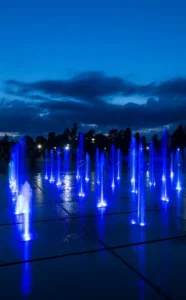- Product Knowledge
What Is an ILDA Laser Light? Key Features, Applications & Buying Guide
ILDA laser lights are professional-grade laser systems designed to meet the rigorous technical and safety standards set by the International Laser Display Association (ILDA). These devices are widely used in stage performances, architectural projections, and artistic installations due to their precision, versatility, and compliance with global safety protocols. In this guide, we’ll explore what makes ILDA lasers unique, their applications, and how to select the right system for your needs.
Understanding ILDA Standards

ILDA (International Laser Display Association) is the leading global organization regulating laser display technologies. Established to promote innovation and safety, ILDA-certified lasers adhere to strict criteria:
Scanning Speed: ILDA mandates a minimum scanning speed of 30,000 points per second (30Kpps) for high-fidelity graphics. Higher-end models, like those from KVANT, achieve speeds up to 45Kpps, ensuring smooth animations and reduced distortion.
Safety Protocols: ILDA-compliant lasers feature automatic shutdown systems if scanning fails, preventing stationary beams that risk eye damage. For example, Maocheng’s IRIS series cuts power within 50ms during malfunctions.
Control Compatibility: These systems support ILDA DB-25 interfaces and software like Pangolin’s Beyond or QuickShow, enabling seamless integration with DMX512 controllers and music synchronization.
Key Features of ILDA Laser Lights
1. High-Speed Galvanometer Scanners
Unlike low-cost lasers using stepper motors, ILDA-certified systems employ galvanometer scanners for rapid beam movement. For instance, Wansheng Laser’s WS-RGB-50W model uses 40Kpps scanners to project intricate text, animations, and 3D effects over distances up to 4.5 kilometers.
2. Multi-Pattern and Color Output
ILDA lasers generate millions of colors by combining RGB wavelengths (e.g., 638nm red, 532nm green, 445nm blue). Advanced models like KVANT’s Spectrum series even incorporate 590nm orange and 577nm yellow OPSL modules for richer hues.
3. Safety and Durability
Top-tier systems include:
IP65/66-rated enclosures for dust/water resistance.
Thermal management (e.g., foam aluminum housings reduce weight while enhancing heat dissipation).
Emergency shutdown ports for manual override during risks.
4. Music Synchronization
Unlike basic “sound-activated” modes, ILDA lasers use audio waveform analysis to sync effects with rhythm. Maocheng’s Pankerlin IRIS5080 synthesizes laser patterns directly with musical beats, outperforming generic audio triggers.
Applications of ILDA Lasers
Stage and Entertainment
Create dynamic laser shows for concerts, clubs, and festivals.
Example: KVANT’s award-winning projections at Slovakia’s Biela Noc festival.
Architectural Lighting
- Highlight landmarks with long-range beams (e.g., 750m mountain projections in Saudi Arabia).
Advertising and Branding
- Display logos or slogans on water screens or fog for high-impact marketing.
Safety-Critical Installations
- ILDA’s fail-safe mechanisms make them ideal for public spaces like theme parks.
How to Choose an ILDA Laser Light
Verify Certification: Ensure the manufacturer is an ILDA member (e.g., KVANT, Wansheng).
Check Scanning Speed: Opt for ≥30Kpps for professional use.
Assess Safety Features: Look for auto-shutoff, remote kill switches, and ILDA 60825 compliance.
Software Compatibility: Prioritize systems supporting Beyond or Phoenix for advanced programming.
Durability: IP65+ ratings and aerospace-grade materials extend lifespan in harsh environments.
Future Trends in ILDA Technology
AI Integration: Companies like Olympus are exploring AI-driven laser diagnostics for real-time adjustment.
Portability: Newer models, like KVANT’s Spectrum series, are 30% lighter without sacrificing power.
Eco-Friendly Designs: Energy-efficient cooling systems and recyclable materials align with sustainability goals.



